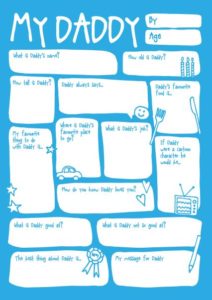Happy (belated) Father’s day!
It’s one of my favourite days of the year for one specific reason. The cards I get from my children.

(You can find this card on thortful.com if you like it)
I love it! And it’s the type of gift that makes my heart swell and love the fact that I am a Dad.
I wish that feeling was there every moment of every day, but…. Im not sure if I can say this outloud… sometimes my children frustrate me…. Just a little. There I said it!
It’s rarely anything big, it tends to be the small things that add up. The ignoring even though you know they’ve heard, the having to repeat myself, the battle over the small mundane tasks.
It can be tiring. And when I’m tired I notice Im less patient and my approach to managing a situation becomes less effective.
However, I am in a lucky position that I know about and have a chance to practice restorative approaches on a day to day basis.
So I wanted to share some tools and tips for others Dad’s out there.
What is Restorative Approaches
The simple answer is an outlook on life that prioritises the building, maintaining and repairing of relationships.
Tools and Techniques for Fathers
Here are some practical tools and techniques that Dad’s can use to build stronger, more connected relationships with their children.
Active Listening
Active listening involves giving your full attention to your child, demonstrating that their thoughts and feelings are important. This means making eye contact, nodding, and responding thoughtfully. When children feel heard, they are more likely to open up and share their experiences.
How to Practice Active Listening:
- Put away distractions, such as phones or laptops, during conversations.
- Reflect back what your child says to show understanding (e.g., “It sounds like you felt upset when that happened.”).
- Ask open-ended questions to encourage further discussion.
Restorative Conversations
Restorative conversations focus on understanding the impact of your actions and finding ways to make it better. These discussions help children learn about accountability and empathy while repairing any harm done to the relationship.
How to Facilitate Restorative Conversations:
- Approach the conversation with a calm and non-judgmental attitude.
- Swap “Why did you do that?” for “What’s happened?”
- Don’t talk over them or correct them, if you disagree, wait and ask if you can offer a different perspective.
Family Circles
Family circles are a structured way to bring everyone together to discuss important topics, celebrate successes, or resolve conflicts. It’s important to involve everyone in the home, sometimes even family outside.
How to Conduct Family Circles:
- Schedule regular times for family circles to discuss both positive and challenging topics.
- Establish ground rules, such as speaking one at a time and respecting each other’s viewpoints.
- Use a talking piece (an object passed around) to ensure everyone has a chance to speak.
Expressing Emotions
Encouraging children to express their emotions helps them develop emotional intelligence and resilience. It’s even more effective if Dads can model this behavior by sharing their own feelings and demonstrating healthy ways to cope with emotions.
How to Encourage Emotional Expression:
- Validate your child’s feelings by acknowledging them (e.g., “It’s okay to feel sad about that.”).
- Share your own feelings and how you manage them (e.g., “I felt frustrated today, so I took a walk to calm down.”).
- Provide a safe space for your child to express their emotions without fear of judgment.
Building Trust Through Consistency
Consistency in words and actions builds trust between Dads and their children. When children know what to expect, they feel more secure and confident in their relationship with their father.
How to Build Trust:
- Follow through on promises and commitments.
- Be reliable and predictable in your responses and behaviour.
- Communicate openly about changes in plans or routines.
Having tried to do this for years by this point, I’ll say this. It is not easy!
As a dad I have all of my own emotions to contend with and I actually think this is one of the biggest issues any parent faces, is managing their own emotions before being able to help a child manage theirs.
But it is well worth doing. When I am restorative with my children I see such a positive response from them most of the time. It doesn’t always work, because we’re human, but the overall impact has been and continues to be huge.




